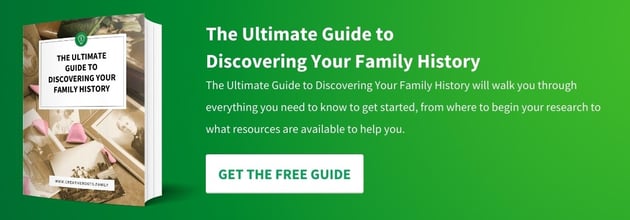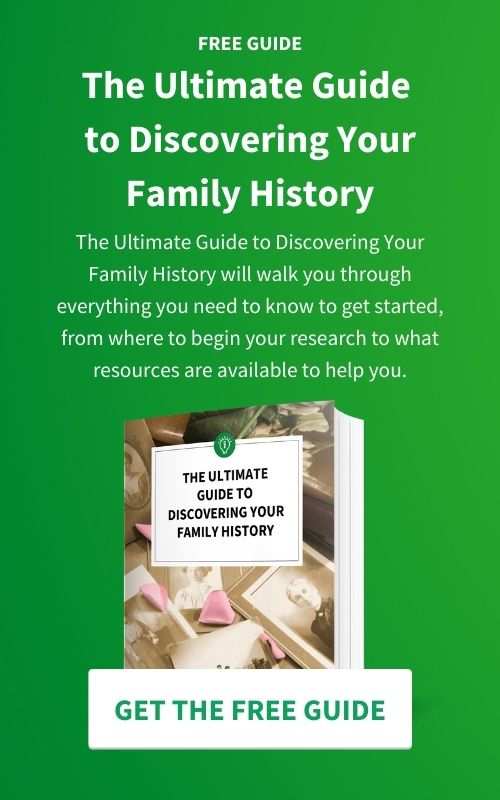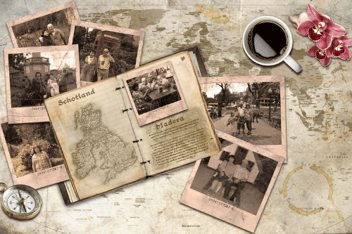The Ultimate Heritage Discovery Checklist: Research Your Family History Efficiently
Understanding your personal heritage and family history is a journey of self-discovery, a quest that transcends generations and connects you with your roots. It's a fascinating expedition into the past that can provide valuable insights into who you are, where you come from, and the rich tapestry of cultures and experiences that have shaped your family over time. The importance of delving into your heritage lies in the wisdom it can impart, the sense of belonging it can instill, and the profound appreciation it can cultivate for the sacrifices and triumphs of those who came before you.
This blog introduces the Ultimate Heritage Discovery Checklist as a powerful tool to help you embark on this journey of heritage exploration efficiently and effectively. By understanding your heritage, you gain a deeper appreciation for your family's unique traditions, stories, and customs. It's not just about discovering names and dates; it's about uncovering the narratives that have moulded your family's identity and the historical context that frames your own life. Whether you're seeking to strengthen family bonds, honour your ancestors, or simply satiate your curiosity, your heritage holds the key. The checklist will guide you step by step, enabling you to navigate the vast sea of genealogical information and providing a structured approach to preserving your family's legacy.
Prepare for Your Heritage Research Journey
- Identify your research goals and objectives:
Before embarking on your heritage journey, it's crucial to define what you hope to achieve. Are you interested in tracing your family tree, uncovering specific historical events, or learning about cultural traditions? Clearly outlining your research goals will help you stay focused and determine the direction of your exploration. - Gather initial family information from relatives:
Start by having conversations with your family members, especially older generations who may hold valuable information. Collect names, dates, locations, and anecdotes about your ancestors. This firsthand knowledge is a treasure trove that can provide crucial leads for your research. - Organize your findings using digital and physical formats:
As your research progresses, you'll accumulate a wealth of documents, photographs, and notes. Create a system to catalogue and store these materials both digitally and physically. Use software or physical binders to keep track of your discoveries, making them easily accessible for future reference. - Create a research plan for efficient discovery:
A well-structured research plan is essential. Define the scope of your project, set milestones, and establish a timeline for achieving your objectives. Having a clear plan will keep you on track, prevent becoming overwhelmed, and help you make the most of your research time. It's a roadmap that guides you through the vast landscape of genealogical information and ensures you don't miss important details.
Utilize Online Resources to Build Your Family Tree
- Introduce popular online databases for genealogy research:
Online genealogy databases have revolutionized family history research. Some of the most popular and valuable resources include Ancestry.com, MyHeritage, FamilySearch, and FindAGrave. These platforms offer vast collections of historical records, family trees, and other genealogical data. Subscribing to one or more of these databases can greatly expand your research possibilities by providing access to census records, vital records, military records, and more. - Discuss the usage of search engines and keyword strategies to find family records:
Beyond dedicated genealogy databases, search engines like Google can also be powerful tools for uncovering family records. Use specific keywords, such as names, dates, and locations, in combination with operators like "site:" to search within specific websites or domains. For instance, you can search for "John Smith site:ancestry.com" to find information related to John Smith on Ancestry.com. Experiment with variations of names and keywords to cast a wider net and increase your chances of locating relevant records. - Provide tips for organizing and citing digital sources:
As you accumulate digital records and documents, it's crucial to stay organized. Create a systematic digital filing structure for your research files. Use clear, consistent file naming conventions, and consider using software like genealogy management programs to help manage and categorize your findings. Additionally, maintain detailed source citations for each piece of information you discover. Accurate citations are essential for tracking the origin of your data and ensuring it's reliable. There are established citation styles, such as the Chicago Manual of Style or the Genealogical Proof Standard, which you can follow to maintain the integrity of your research. Properly organizing and citing your digital sources will make your research more credible and easier to share with others.
Delve into Offline Archives for In-depth Research
- Unearth local and national archives and libraries:
When conducting genealogical research, local and national archives and libraries are invaluable resources. Local archives often house historical documents specific to your region, including birth and death records, land deeds, wills, and more. National archives, on the other hand, may contain broader historical records, such as military service records, immigration documents, and federal censuses. To access these resources, start by identifying the locations of relevant archives and libraries. You can do this by searching online or contacting local historical or genealogical societies. It's essential to plan your visit in advance, as different institutions may have varying access policies and operating hours. - Discover the value of historical societies, churches, and community centers:
Historical societies, churches, and community centers often hold unique genealogical records and local histories that may not be available elsewhere. These organizations can provide you with access to family records, oral histories, church baptism and marriage records, and other documents of community significance. To tap into these valuable resources, begin by reaching out to these institutions and introducing yourself as a genealogist. Attend local historical society meetings or church gatherings to build relationships and gain insights. Many times, volunteers and historians associated with these groups are eager to help researchers and share their knowledge. Keep in mind that some historical societies may charge nominal fees or request donations for their assistance. - Offer suggestions for accessing and navigating these resources:
To access and navigate these resources effectively, start by familiarizing yourself with the cataloging and indexing systems used by the specific archive or library. Seek guidance from the staff or volunteers on-site; they can often provide valuable information on how to locate and handle documents. Bring a notepad, camera, or scanner to capture records while respecting any rules and restrictions imposed by the institution. Additionally, consider making appointments in advance if possible, as it may grant you access to materials that require special handling or are stored off-site. Organize your research objectives before your visit to maximize your time at these institutions, and always be courteous and appreciative of the assistance you receive. Building good relationships and showing respect will go a long way in genealogical research.
Consider DNA Testing for Additional Insights
- Discuss the benefits of DNA testing for heritage discovery:
DNA testing has become a powerful tool for genealogists, offering several key benefits. It can help you:
-
- Confirm or refute connections: DNA testing can validate or challenge the paper trail of your family tree, allowing you to verify ancestral relationships.
- Discover unknown relatives: DNA matches can reveal previously unknown cousins or distant relatives who may hold valuable information about your family history.
- Uncover ethnic origins: Many DNA tests provide estimates of your genetic heritage, shedding light on the regions and populations from which your ancestors hailed.
- Break through brick walls: When you hit a research dead-end, DNA testing can provide new leads and avenues to explore.
There are various DNA testing companies and test types available, each with its own strengths and limitations. Some of the most popular options include:
-
- Autosomal DNA tests: These tests provide information about your recent ancestry and are offered by companies like AncestryDNA, 23andMe, and MyHeritage.
- Y-DNA tests: These tests trace the direct paternal line and are helpful for researching your father's father's line. Companies like FamilyTreeDNA offer these tests.
- Mitochondrial DNA tests: These tests trace the direct maternal line and can be beneficial for researching your mother's mother's line.
- Combination tests: Some companies offer comprehensive tests that combine autosomal, Y-DNA, and mitochondrial testing, providing a broader view of your heritage.
3. Weigh the advantages and potential limitations of DNA testing results:
While DNA testing is incredibly valuable, it's essential to be aware of its limitations:
-
- Privacy concerns: Some individuals have concerns about the privacy of their genetic data and how it might be used, so it's crucial to review and understand the privacy policies of the testing company.
- Incomplete picture: DNA tests provide a snapshot of your genetic heritage, but they don't encompass your entire family tree. They may not provide information on cousins who haven't taken the same test.
- Interpretation complexity: Understanding and interpreting DNA results can be complex. It's helpful to use online tools and consult with genetic genealogists to make sense of your data.
In summary, DNA testing is a valuable asset in genealogical research, but it should be considered alongside traditional genealogical research methods. It can provide insights, confirm relationships, and uncover hidden family connections, but it also has limitations and privacy considerations that should be carefully evaluated.
Preserve and Share Your Heritage Findings
- Provide guidelines for preserving and organizing discovered information:
Preserving your findings is essential for future generations. Create a system for organizing and storing your documents, photographs, and records, whether in physical or digital form. Utilize genealogy software, binders, or cloud storage to keep everything well-structured and accessible. Consistent and detailed note-taking is crucial for preserving context and sources, ensuring your research remains accurate and comprehensible. - Suggest ways to share family history findings with relatives:
Sharing your discoveries can strengthen family bonds and ensure your research is passed down. Consider creating a family history book, website, or social media presence to showcase your findings. Share anecdotes and stories during family gatherings, reunions, or through newsletters. Encourage open discussions with relatives about your research to foster a sense of collective heritage appreciation. - Encourage continued exploration and engagement with one's heritage:
The journey of uncovering your family history is ongoing. Encourage readers to maintain their interest and curiosity, delve deeper into their heritage, and seek out further sources and resources. Participate in cultural events, heritage-specific activities, and local historical societies. Emphasize the significance of heritage in shaping their identity and that of future generations. - Recap the essential steps of the heritage discovery checklist and encourage readers to embark on their family history research journey:
Summarize the key takeaways from the heritage discovery checklist, emphasizing the importance of setting clear research goals, utilizing online and offline resources, considering DNA testing, and preserving and sharing their findings. Invite readers to start or continue their own heritage research journey, reminding them that this endeavour is not just about the past but about forging a meaningful connection to their family's history and culture. Provide additional resources and communities for those interested in exploring their heritage further.
Conclusion
Remember, this journey is not a one-time endeavour but an ongoing exploration. As you dive into online databases, local archives, and DNA testing, you'll peel back the layers of your family's history. Through meticulous preservation and sharing of your findings, you ensure your research becomes a bridge between generations. It's a tribute to your ancestors and a gift to your descendants, a testament to the enduring relevance of heritage in our lives. So, take that first step today and let the Heritage Discovery Checklist be your guiding star on this fascinating voyage into your family's past.


Article by Carol Walsh
Carol Walsh is the CEO of Creative Roots, a professional genealogy company. She has a passion for preserving family history and storytelling. Carol's research methodology centers around fact-finding and publishing in a format that readers can use to preserve the stories. Her ultimate goal is to help families connect with their past and each other.





